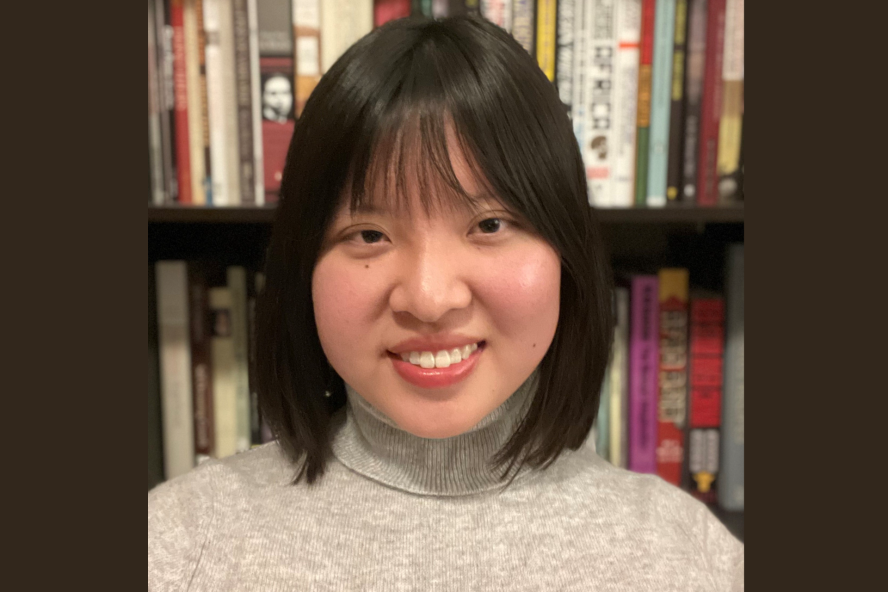Alumni Profile: Leanne Loo

Leanne Loo, A22 graduated this past spring with a bachelor’s degree in Anthropology, and she continues to impact the Tisch College and Tufts community in her first year of the Master of Public Health (MPH) program at Tufts University School of Medicine (TUSM). At the same time, she is working in and with the community as the exhibition and curatorial assistant for Endurance Streets, an exhibit in Chinatown produced by the Chinese Historical Society of New England (CHSNE) in partnership with Tisch College’s Program for Public Humanities and the Tisch College Community Research Center (TCRC).
Leanne’s work is well known at Tisch College and spans education, research, and practice. During her time as an undergraduate, Leanne was a Tisch Scholar, participated in multiple working groups, and was a member of SYNS (Synaptic Scholars), a Tisch College affiliated student group. Leanne was honored with a Presidential Award for Civic Life this past April and was inducted into Honos Civicus, Tufts’ civic honor society, at graduation. She participated in community-engaged research through a research project she worked on with the Chinatown Land Trust. Leanne also worked with Peter Levine, Associate Dean of Academic Affairs, on a language justice project as part of a Projects for Peace grant through Middlebury College and the Kathryn Davis Foundation.
Like more and more applicants each year, Tisch College drew Leanne to Tufts. With an interest in public health and health equity, the Tisch Scholars Program resonated with her, given its focus on working with organizations to address pressing social issues while also engaging in critical reflection together. “The Scholars Program was actually one of the reasons I applied, and what made Tufts one of my top choices... The Scholars Program was really critical, or at least self-conscious, of recognizing the power dynamics between being a university and then being in a community, in people's neighborhoods and cities.”
As a Scholar, Leanne was inspired by her interactions with fellow students and staff, “I really appreciated my Tisch Scholars community because everyone had very different perspectives, but I think we all have the same end goal of how we can build a better world or improve people’s lives.” Her Scholars fieldwork at Oxfam America and the Campaign Against Racism at EqualHealth focused on finding ways to make change by working directly within communities while remaining mindful of the colonial systems and institutional power dynamics present. Her group's capstone project grew out of these experiences as an art exhibit in Barnum Hall titled, “Re-imagining Relations: Unsettling Time and Place” displaying artwork that sought “to unsettle colonial and capitalist notions of time and place.”
Leanne’s experiences working deliberately and mindfully within communities on issues of health equity are integral to her current work with Endurance Streets and in her MPH program. “I go into class with two mindsets. One is, how could I learn these materials and become a better public health practitioner to understand how diseases are being spread and how we can prevent or treat them? But then the second mindset is [being] a bit more critical of certain studies, designs, or the language or categories being used, especially when it comes to race and racism.”
Endurance Streets is an outdoor exhibit in Chinatown documenting the neighborhood’s responses to the economic crises and racial violence experienced since the winter of 2020. It connects to the hundred-year history of this community, using digitalized images of historical records and photographs. Leanne was introduced to the project through Shirley Mark, Director of Community Partnerships and Assistant Dean for Diversity and Inclusion (ADDI) at Tisch College. The two connected over Asian American history when Leanne presented her research on the immigrant history trail project. For Leanne, this project was a logical progression of her work, allowing her to “put what I've learned into practice, but also continuing to learn from the communities around me in partnership with Tisch College and community organizations like the Chinese Historical Society of New England (CHSNE).”
For Leanne, the exhibit’s existence itself brings attention to the institutional tensions within Chinatown, “it's ephemeral. It will disappear. But the changes Tufts has made in Chinatown are extremely physical and will not disappear. They affect people's livelihoods, so there's that tension as well... that comes with being a Tufts student, but it's even more intensified for me because I’m now a student in Chinatown.”
Leanne’s advice to current students is to get out into the greater Boston community and “do your own learning.” She reflects that much of what shaped her education was her experience learning from organizers and experts, “you're going to hear very different things if you’re speaking to students within a classroom... so I think joining a political organization and seeking political education outside of Tufts is really important.” Leanne is showing future students precisely how that can be done.